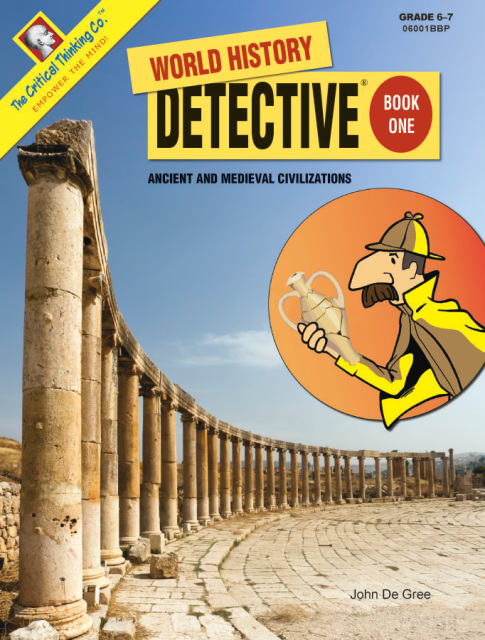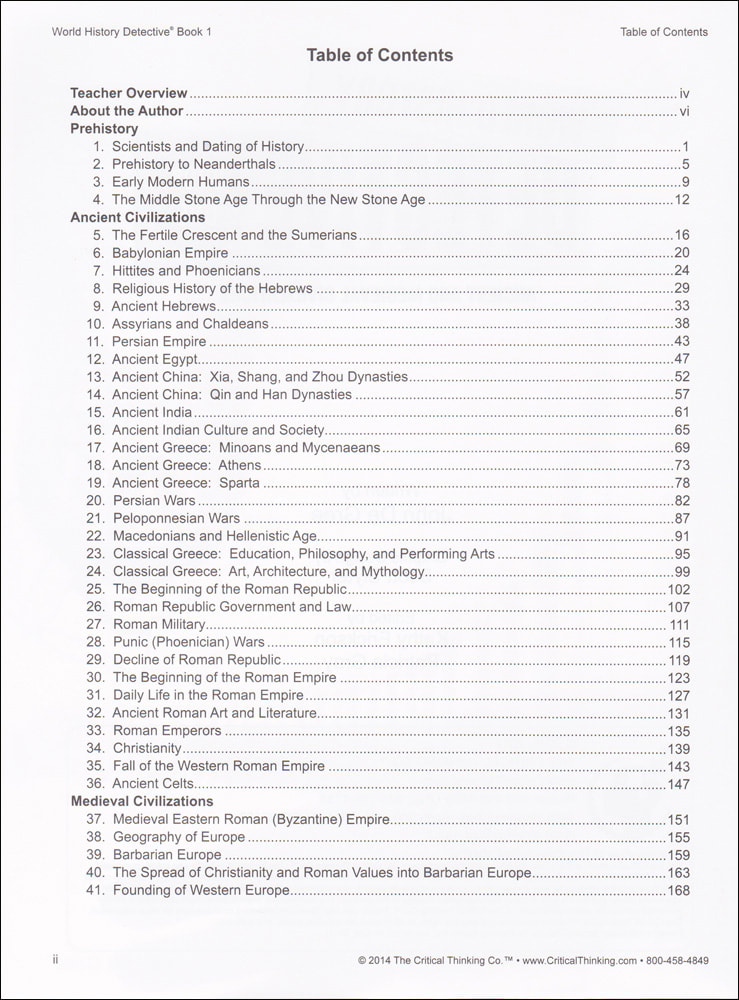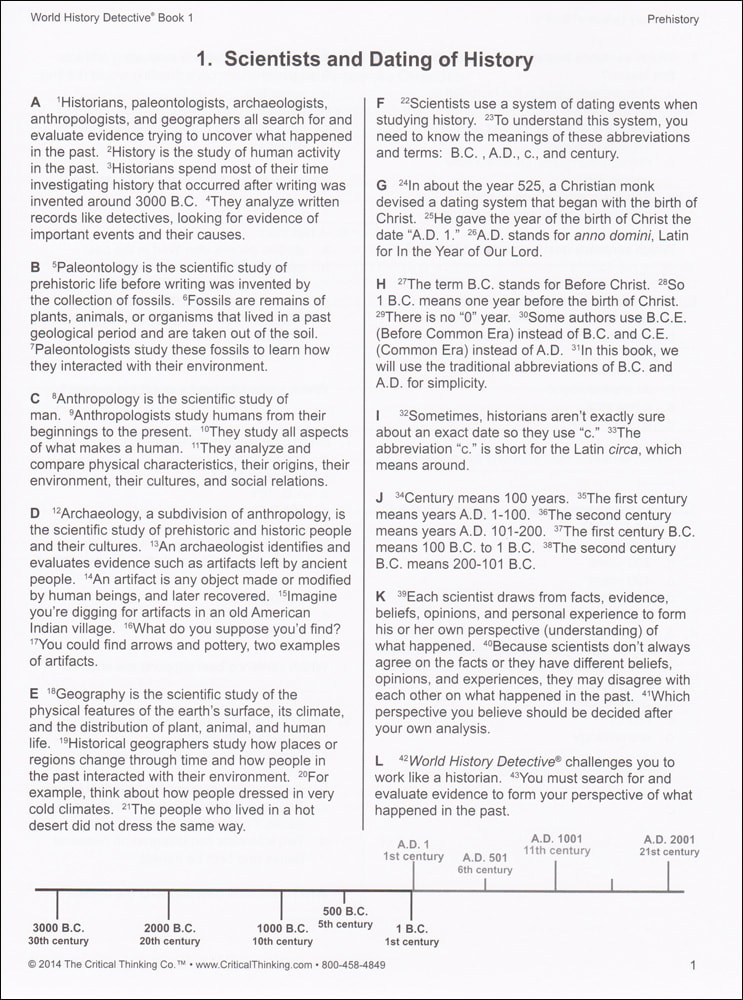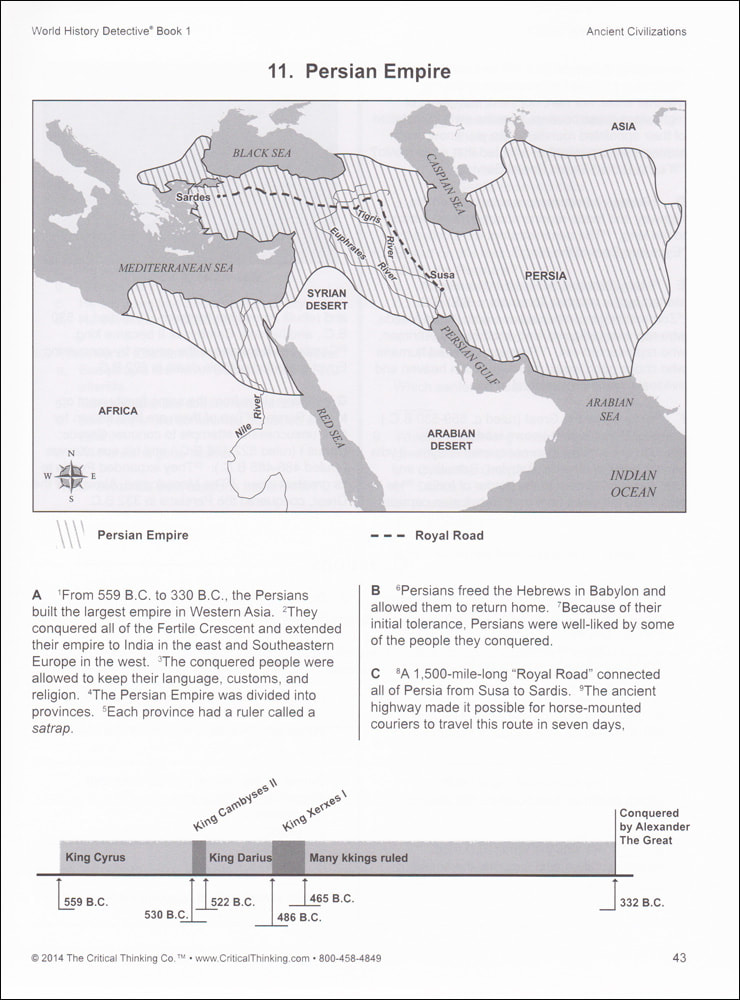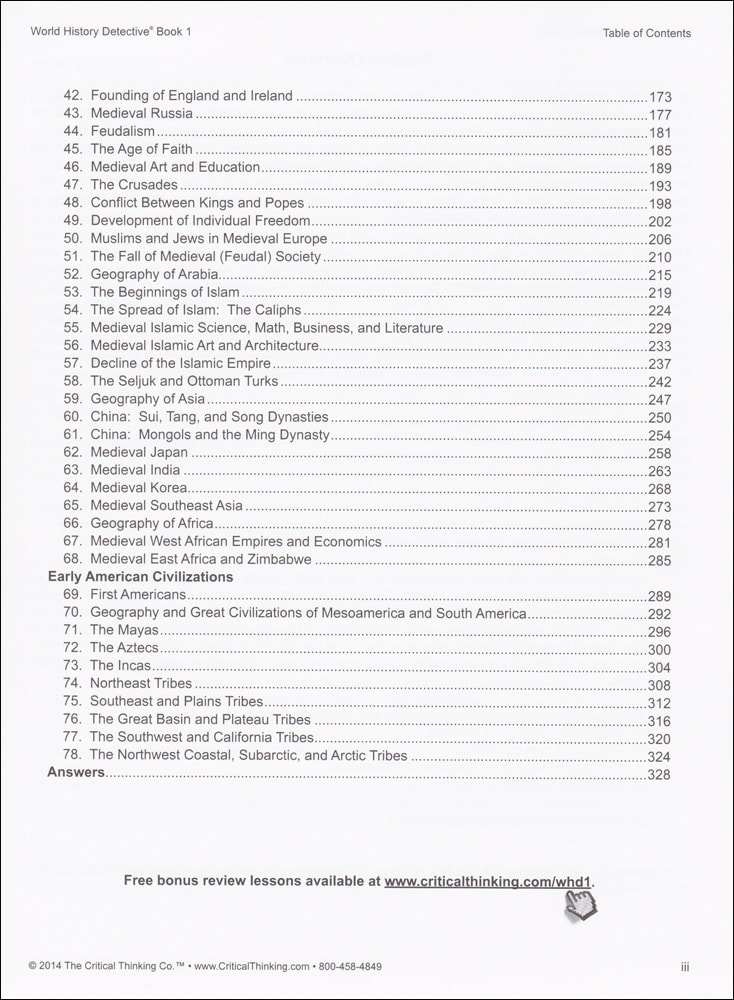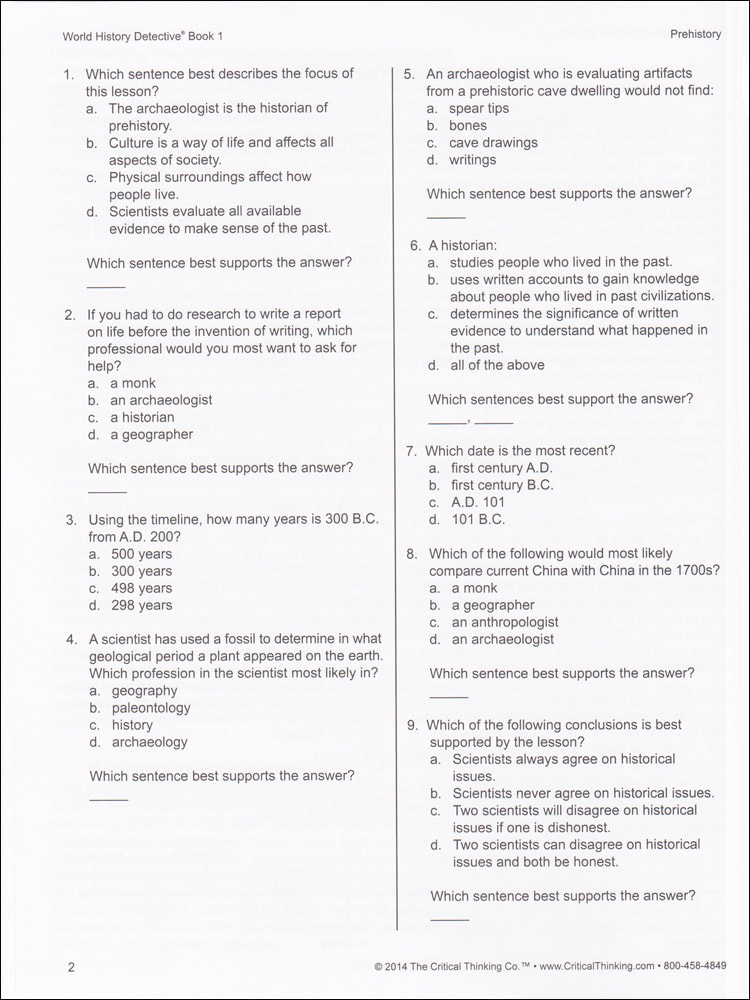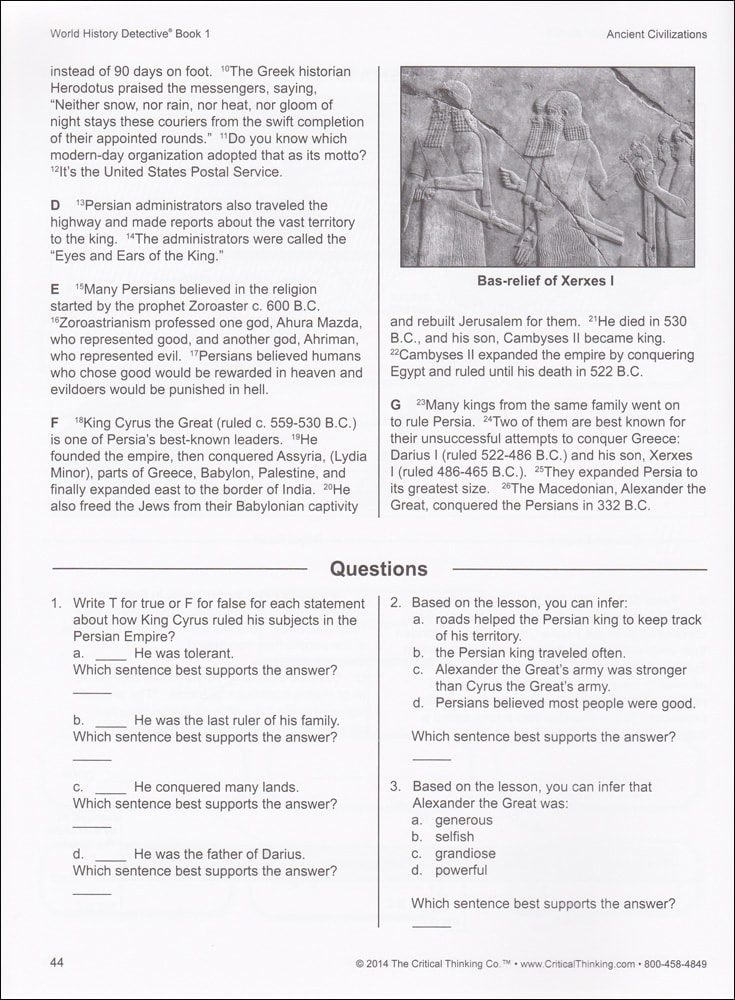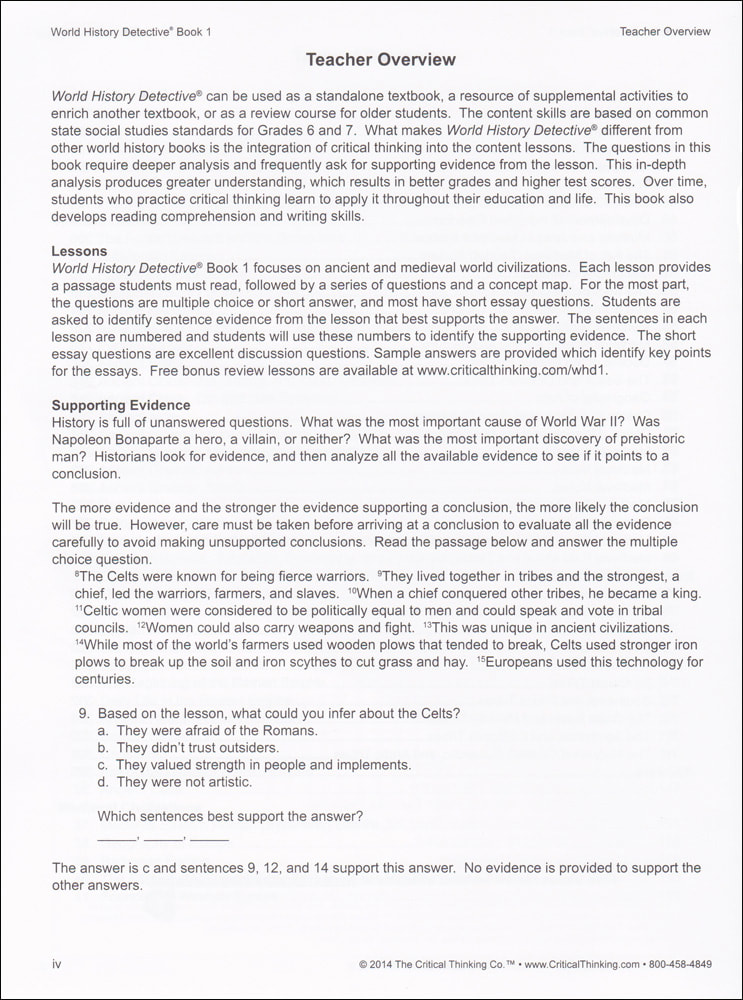- Store
- >
- Ancient History
- >
- World History Detective, Ancient and Medieval Civilizations
World History Detective, Ancient and Medieval Civilizations
SKU:
007
$36.99
$36.99
Unavailable
per item
World History Detective® can be used as a standards-based, stand-alone textbook, a resource with supplemental activities to enrich another textbook, or as a review course for older students.
-
Description
-
Details
-
Samples
-
Reviews
-
Related Resources
<
>
Socratic History Curriculum for Middle School
The captivating lessons and activities in this 368-page book can be used as a standards-based, stand-alone textbook, a resource for supplemental activities to enrich another textbook, or as a review course for older students. What makes World History Detective® different from other world history books is the integration of critical thinking into the content lessons. The questions in this book require deeper analysis and frequently ask for supporting evidence from the lesson. This in-depth analysis produces greater understanding, which results in better grades and higher test scores. Over time, students who practice critical thinking learn to apply it throughout their education and life. This book also develops reading comprehension and writing skills.
Students begin by analyzing a lesson. Next, they apply critical thinking skills to answer multiple choice and short essay questions. Finally, students support their answers by identifying evidence learned from the lesson. World History Detective® includes geographical maps, timelines, and concept maps. It develops critical thinking skills in lessons that teach the roles that technology, power, institutions, ideas, and trade played in shaping history.
Winner of the Tillywig Brainchild Award, Word History Detective® covers ancient, medieval, and Early American civilizations. These are the lessons that are covered:
Students begin by analyzing a lesson. Next, they apply critical thinking skills to answer multiple choice and short essay questions. Finally, students support their answers by identifying evidence learned from the lesson. World History Detective® includes geographical maps, timelines, and concept maps. It develops critical thinking skills in lessons that teach the roles that technology, power, institutions, ideas, and trade played in shaping history.
Winner of the Tillywig Brainchild Award, Word History Detective® covers ancient, medieval, and Early American civilizations. These are the lessons that are covered:
- The Fertile Crescent
- Mesopotamia
- Sumerians
- Babylonians
- Hittites
- Phoenicians
- Hebrews
- Assyrians
- Babylonian
- Persia
- Egypt
- Celts
- India
- Buddhism
- Hinduism
- China
- Classical Greece
- Roman Republic
- Christianity
- Roman Empire
- Byzantine Empire
- Founding of Western Europe
- Islamic Dynasties
- Russia
- Renaissance
- The Crusades
- China
- Japan
- India
- Korea
- Southeast Asia
- Africa
- East Africa
- Zimbabwe
- West Africa
- Mesoamerica
- Mayas
- Incas
- Aztecs
- Northeast Woodland Tribes
- Plains Tribes
- Southwest Tribes
- Inuit
Teacher Resources
For Socratic teachers, this book provides a lesson on teaching students to identify evidence. It also provides answers to every homework activity as well as grade level standards.
Critical Thinking Skills
- Identify evidence
- Evaluate evidence
- Draw inferences and conclusions
Item#:01
Author(s): John De Gree
Type: Student Book with Answers
Media: Paperback Book
License: Reproducible
ISBN–10: 1-60144-144-4
ISBN–13: 978-1-60144-144-7
Pages: 368, perforated
Author(s): John De Gree
Type: Student Book with Answers
Media: Paperback Book
License: Reproducible
ISBN–10: 1-60144-144-4
ISBN–13: 978-1-60144-144-7
Pages: 368, perforated
"World History Detective® accomplishes more than just teaching world history. It also can replace reading comprehension activities since that is a major function of the lessons. It might provide a significant amount of composition activity, especially if you use the opportunity to help students develop essay writing skills. Depending upon how often you use the lessons, students can complete World History Detective, Book 1 in one or more years. A one-year schedule would require at least two lessons per week, but using it alongside another program over a longer period of time should work fine too." -Cathy Duffy Review
"Surprisingly my 11-year-old REALLY got into this workbook. GASP! A workbook for history? Yes! Honestly, I was just as surprised! World History Detective® has 78 Civilizations to learn in self-guided chronological order. My son really like the condensed and concise information about civilizations filled with great maps, timelines, deductive question and concept maps." -Lisa Keva
"Importantly, the workbook portions are not simple read-and-regurgitate queries. Instead your student will be asked to point out which statements in a set of four are fact and which are opinion; or which of these phrases can be inferred from the lesson, and which sentences best support that theory. These types of questions help your child to grasp that history is always interpreted by those telling the story and to think through the varied reasons why an event happened as it did." -Timberdoodle
"I absolutely LOVE the critical thinking aspects of the curriculum. Implementing critical thinking into the reading and discussion of history is a powerful tool to help our children understand what they are reading as well as form an opinion and knowledge that they will be able to use in many situations in life." -Dina, California
Timberdoodle:
On the one hand there are elements of World History Detective common to most textbooks. Each lesson starts with a 1- to 2-page article about a topic such as Medieval Art and Education or Religious History of the Hebrews or The Incas. The article is followed by multiple choice questions, write-in questions, and concept map diagrams to fill in. Maps, timelines and illustrations are also sprinkled throughout.
No Read and Recall Queries
But importantly, the workbook portions are not simple read-and-regurgitate queries. Instead your student will be asked to point out which statements in a set of four are fact and which are opinion; or which of these phrases can be inferred from the lesson, and which sentences best support that theory. These types of questions help your child to grasp that history is always interpreted by those telling the story and to think through the varied reasons why an event happened as it did.
Features
"Surprisingly my 11-year-old REALLY got into this workbook. GASP! A workbook for history? Yes! Honestly, I was just as surprised! World History Detective® has 78 Civilizations to learn in self-guided chronological order. My son really like the condensed and concise information about civilizations filled with great maps, timelines, deductive question and concept maps." -Lisa Keva
"Importantly, the workbook portions are not simple read-and-regurgitate queries. Instead your student will be asked to point out which statements in a set of four are fact and which are opinion; or which of these phrases can be inferred from the lesson, and which sentences best support that theory. These types of questions help your child to grasp that history is always interpreted by those telling the story and to think through the varied reasons why an event happened as it did." -Timberdoodle
"I absolutely LOVE the critical thinking aspects of the curriculum. Implementing critical thinking into the reading and discussion of history is a powerful tool to help our children understand what they are reading as well as form an opinion and knowledge that they will be able to use in many situations in life." -Dina, California
Timberdoodle:
On the one hand there are elements of World History Detective common to most textbooks. Each lesson starts with a 1- to 2-page article about a topic such as Medieval Art and Education or Religious History of the Hebrews or The Incas. The article is followed by multiple choice questions, write-in questions, and concept map diagrams to fill in. Maps, timelines and illustrations are also sprinkled throughout.
No Read and Recall Queries
But importantly, the workbook portions are not simple read-and-regurgitate queries. Instead your student will be asked to point out which statements in a set of four are fact and which are opinion; or which of these phrases can be inferred from the lesson, and which sentences best support that theory. These types of questions help your child to grasp that history is always interpreted by those telling the story and to think through the varied reasons why an event happened as it did.
Features
- Interpret and apply complex texts, instructions, illustrations, etc.
- Recognize and clarify issues, claims, arguments, and explanations.
- Distinguish: conclusions, premises (reasons), arguments, explanations, assumptions (stated/unstated), issues, claims (statements), suppositions, unstated conclusions, unstated premises and implications.
- Recognize ambiguity and unclearness in claims, arguments, and explanations.
- Distinguish necessary and sufficient conditions.
- Describe the structure or outline of arguments and explanations: confirmation, disconfirmation.
- Evaluate whether an inductive argument is strong or weak.
- Evaluate claims and arguments in terms of criteria such as: consistency, relevance, support.
- Evaluate analogical arguments and inductive generalization arguments in terms of criteria, such as: the greater the number of similarities between the conclusion and the premises regarding the sample, the stronger the argument.
- Assess the relevance of claims to other claims, and to questions, descriptions, representations, procedures, information, directives, rules, principles, etc.
- Evaluate whether a deductive argument is valid or invalid (logical form): categorical, truth-functional, and semantic/definitional.
- Distinguish supporting, conflicting, compatible, and equivalent claims, arguments, explanations, descriptions, representations, etc.
- Identify and avoid errors in reasoning, informal fallacies: begging the question, equivocation, post hoc, ergo propter hoc (after that, therefore, because of that), false dilemma/false dichotomy fallacy (line drawing fallacy, perfectionist fallacy), smoke screen/red herring/rationalizing, hasty generalization, appeal to ridicule/sarcasm, ad hominem fallacy (personal attack, poisoning the well), appeal to illegitimate authority, loaded question, evidence surrogate, stereotyping , appeal to consequences (favorable or unfavorable), "wishful thinking", genetic fallacy, biased generalization, anecdotal evidence.
- Discern whether pairs of claims are consistent, contrary, contradictory, or paradoxical.

